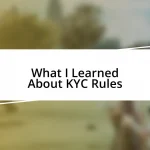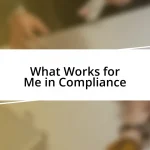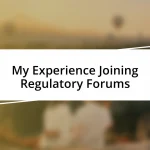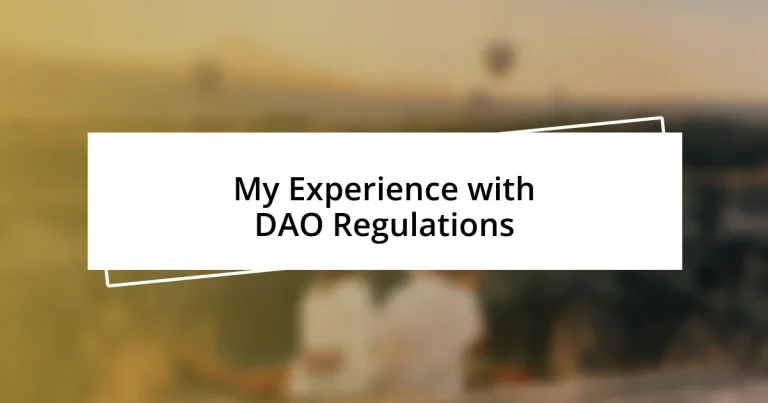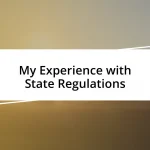Key takeaways:
- Understanding DAO regulations is essential for compliance, fostering trust, and encouraging participation among members.
- Successful DAO governance requires clear communication, legal expertise, and regular training to adapt to evolving regulatory landscapes.
- Future trends indicate a focus on transparency, standardized compliance frameworks, and the necessity for DAOs to remain adaptable to local regulatory changes.
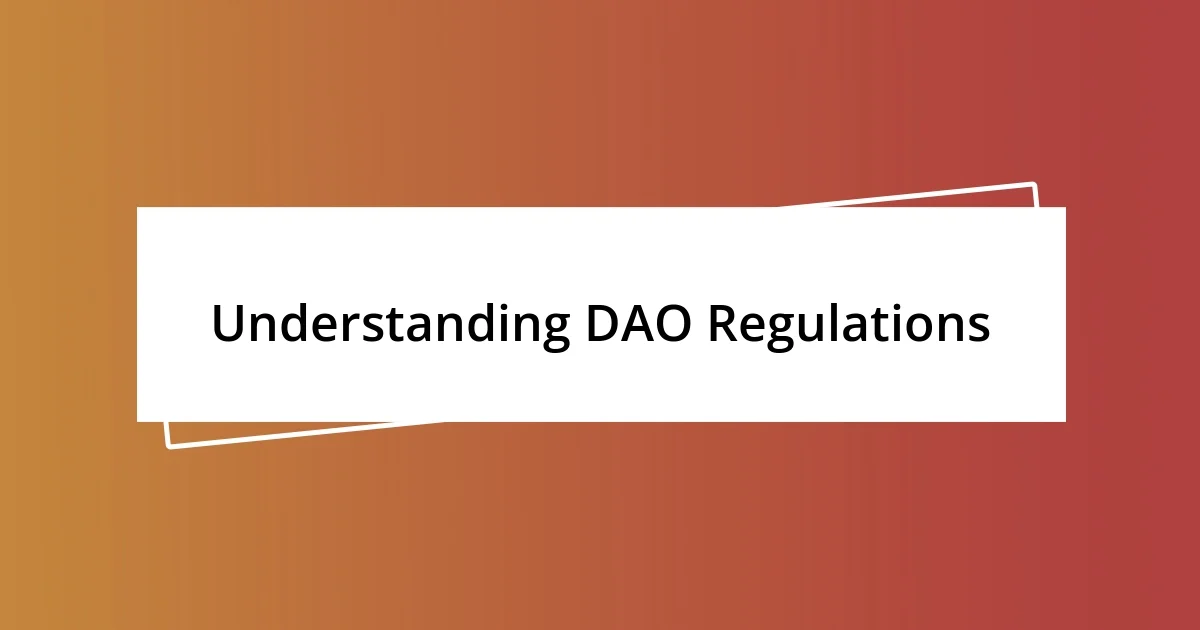
Understanding DAO Regulations
Understanding DAO regulations can feel overwhelming, especially for newcomers. I remember my initial confusion during a webinar explaining how decentralized autonomous organizations function within the legal framework. I kept wondering, how can something so fluid and dynamic fit into traditional regulatory structures? It was enlightening to realize that while DAOs operate without central leadership, they still need to conform to local laws to ensure compliance and protection.
One thing that struck me during my research was the challenge of balancing innovation with regulation. DAOs are designed to encourage participation, but without clear regulations, participants can feel lost or even vulnerable. In my experience, I’ve seen discussions about governance and accountability evolve into passionate debates among members. This makes me think—how do we strike that balance where creativity thrives while still providing necessary oversight?
When I engage with community members about governance frameworks, I often see a mix of enthusiasm and trepidation. The nuances of token-based voting systems can spark insightful debates about power dynamics. It leaves me wondering, how can we build a regulatory landscape that robustly supports DAOs while still respecting their core principles of decentralization? This ongoing conversation is crucial as we push forward into a more digitized organizational future.
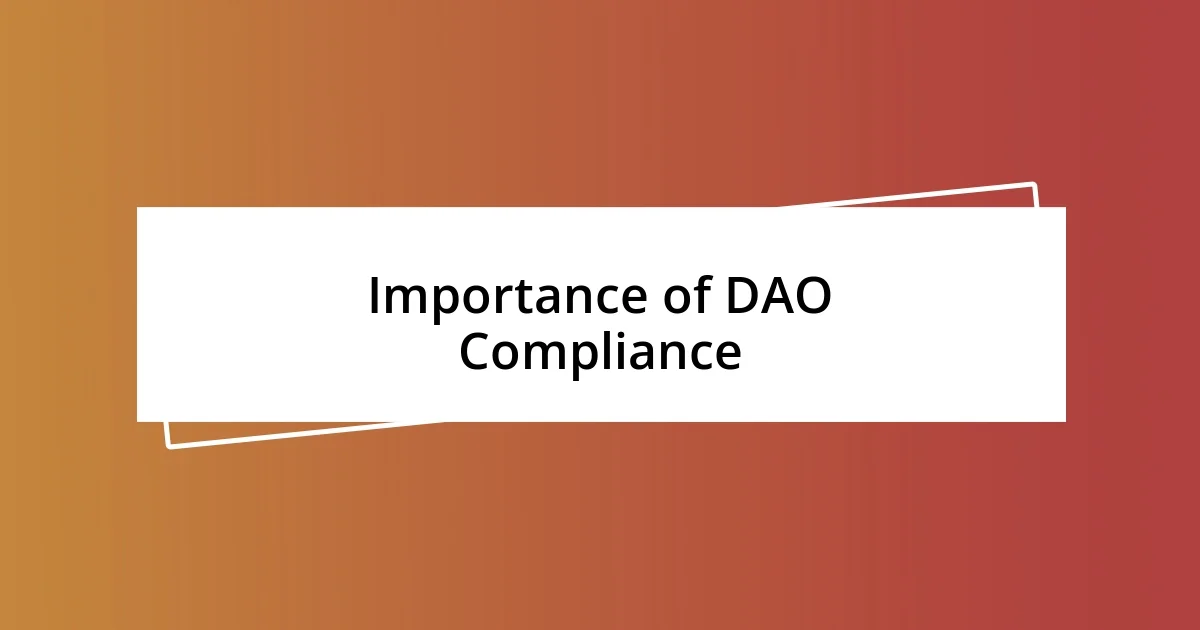
Importance of DAO Compliance
Ensuring compliance within a DAO isn’t just a legal obligation; it significantly impacts trust and cooperation among members. I’ve witnessed firsthand how clear compliance can foster a sense of security within the community, making individuals feel more valued and respected. When I participated in a DAO that prioritized transparency about its regulatory obligations, it was as if the entire group exhaled—suddenly, we could focus on innovation rather than worrying about potential legal repercussions.
Here are some reasons why DAO compliance is vital:
- Builds Trust: Members are more likely to engage when they see a commitment to compliance.
- Encourages Participation: Clarity in regulations can lead to increased contributions from members who feel secure.
- Reduces Risk of Legal Issues: By adhering to laws, DAOs can avoid costly legal battles that may arise from non-compliance.
- Fosters a Positive Reputation: Compliant DAOs can attract partnerships and investments, enhancing growth opportunities.
- Promotes Sustainable Development: Compliance helps ensure that the DAO can operate smoothly over the long term, avoiding disruptions from regulatory scrutiny.
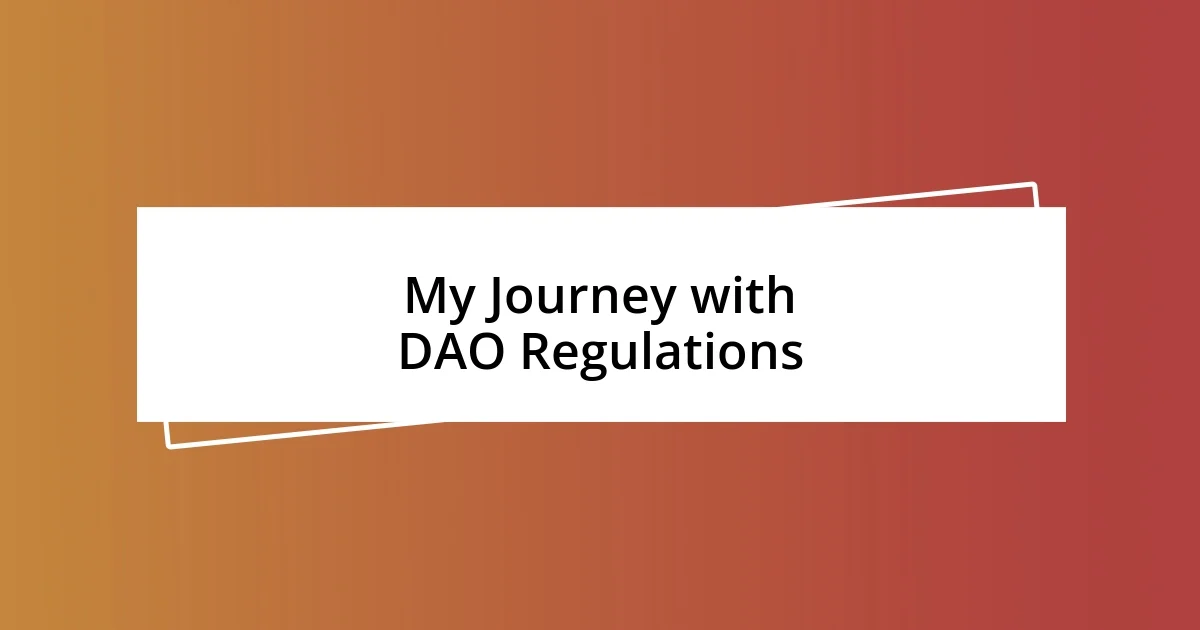
My Journey with DAO Regulations
My early experiences with DAO regulations were eye-opening. I’ll never forget the moment I sat in a roundtable discussion after attending a major blockchain conference. As members shared their journeys through compliance hurdles, I felt a mix of inspiration and apprehension. It was refreshing to hear stories of success, but it also made me realize the heavy weight of regulatory concerns that many organizations bear. This environment sparked a passion in me to understand the delicate dance of fostering innovation while adhering to a legal framework.
During my time in various DAOs, I’ve noticed how differing regulatory landscapes across countries create hurdles for collaboration. For instance, I was part of a project that aimed to connect members from multiple nations. The excitement was palpable, but then came the legal discussions—and with them, the tension. I saw firsthand how some members felt constrained by compliance issues, while others thrived in finding creative workarounds. This taught me that while regulations can impose limits, they can also inspire unique solutions when approached with an open mind.
Reflecting on these experiences, I’m continually struck by the resilience I’ve seen in DAO communities. I remember chatting with a fellow member who had faced significant regulatory pushback but chose to adapt rather than retreat. He passionately spoke about harnessing that challenge to refine their governance model. His tenacity reminded me that navigating regulations can lead to deep insights and innovation if we approach them together, rather than as obstacles.
| Aspect | Personal Experience |
|---|---|
| Initial Confusion | Felt overwhelmed during early discussions on DAOs and regulations. |
| Inspirational Stories | Heard uplifting stories of success in compliance that motivated me. |
| Cultural Challenges | Faced difficulties working across different legal frameworks in international DAOs. |
| Resilience | Observed the adaptability of communities in the face of regulatory challenges. |
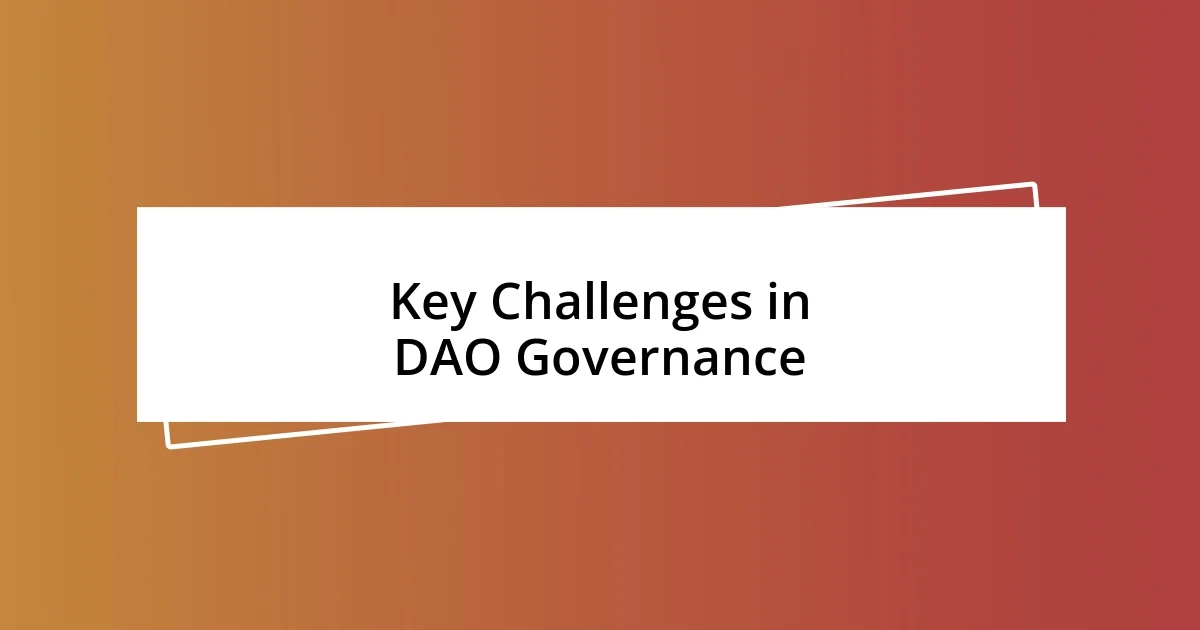
Key Challenges in DAO Governance
Navigating the complexities of DAO governance often feels like trying to hit a moving target. I remember a specific meeting where our governance model was up for review. The discussion quickly spiraled into debates about decision-making processes. Some members felt empowered, while others were left grappling with feelings of exclusion. This experience highlighted how critical it is for DAOs to establish inclusive governance structures that genuinely reflect the will and needs of all members.
One pressing challenge I faced was the lack of clarity in regulatory frameworks. There were moments I found myself questioning, “Are we truly compliant, or are we just hoping for the best?” I recall participating in a vote that hinged on a new proposal related to regulation. The uncertainty left many feeling paralyzed, which ultimately stalled progress. It’s clear to me that without well-defined regulations, DAOs can struggle to make decisions, impacting overall effectiveness and participation.
Moreover, the tension between innovation and regulatory compliance often creates a palpable sense of unease. I’ve been in situations where I saw brilliant ideas fall by the wayside simply because they didn’t fit neatly into existing regulations. I remember a passionate pitch for a feature that would revolutionize our operations, but it quickly became a topic of concern over possible legal ramifications. This scenario made me realize that while the obstacles posed by regulations are daunting, they can also serve as a springboard for creative problem-solving within the community, making it essential for DAOs to embrace this challenge rather than shy away from it.
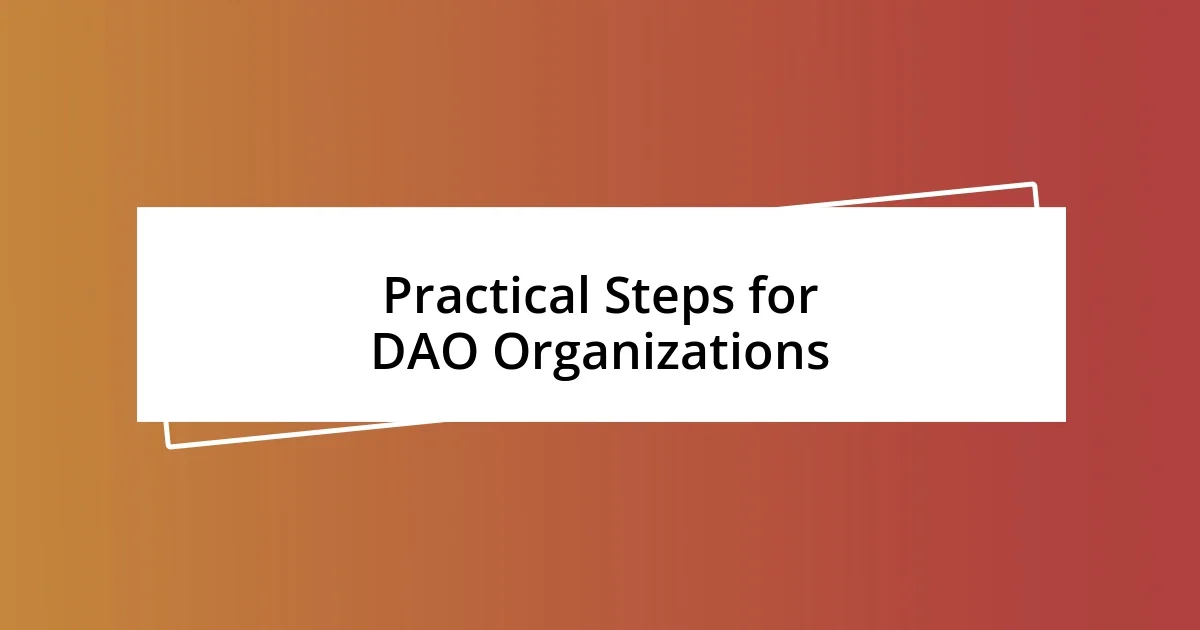
Practical Steps for DAO Organizations
When it comes to practical steps for DAO organizations, the first thing I learned is the importance of establishing clear communication channels. In one project I was involved with, our team set up a dedicated forum to discuss regulatory updates and compliance questions. This wasn’t just about sharing information; it became a space where members felt comfortable voicing concerns and asking questions. How often do we miss out on valuable insights simply because we aren’t talking enough? I can tell you from experience that fostering an open dialogue can demystify regulations and empower members to engage more actively.
Next, I found that investing in legal expertise is a game changer. In one DAO, we brought on a consultant who specialized in blockchain regulations to guide our decision-making process. I initially felt hesitant about the costs, but that investment paid off tenfold. It not only helped us navigate compliance but also reassured members who were unsure about our legal standing. I genuinely believe that having knowledgeable resources can transform the way a DAO operates and innovates. How could we risk our hard work without protecting it through the right channels?
Finally, integrating regular training on regulatory changes has proven invaluable. I recall a workshop we organized where members could learn about emerging laws affecting our DAO and share personal stories about how these had impacted their projects. The collective experience we gained fostered a sense of unity and readiness. It’s one thing to understand regulations; it’s another to apply that knowledge in a way that resonates with the community. After all, isn’t adaptability the core of what makes DAOs special? Through these deliberate efforts, I’ve seen organizations strengthen their foundations while encouraging innovation.
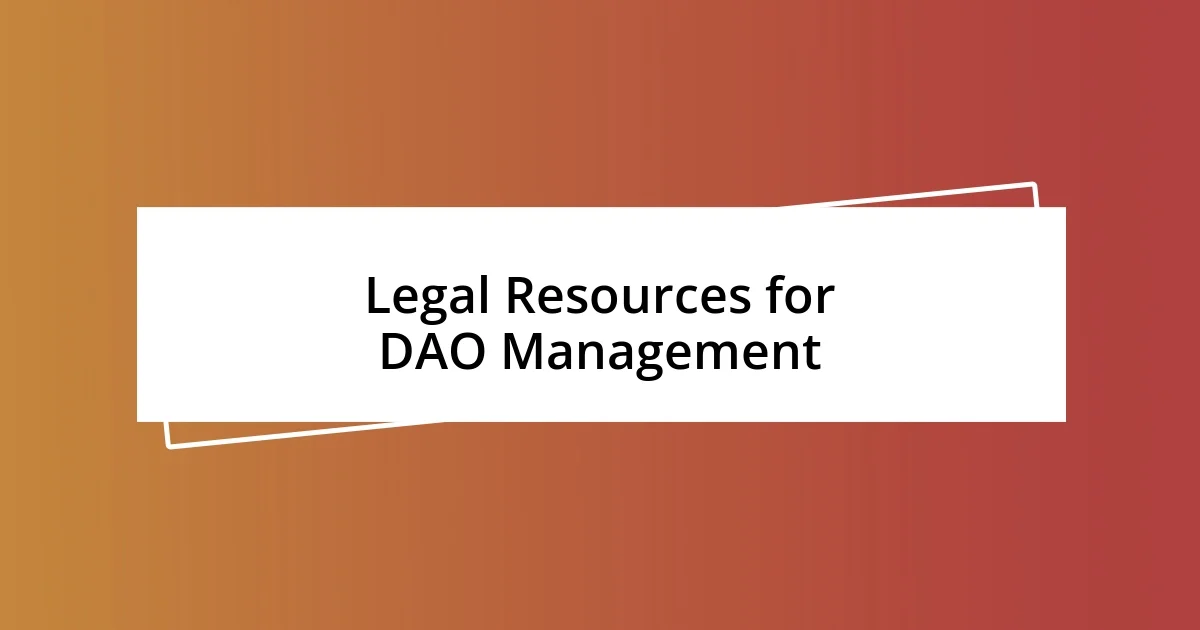
Legal Resources for DAO Management
One resource that I found invaluable for managing DAO compliance is specialized legal databases. When I first delved into these platforms, I was amazed by the wealth of information they provided, from regulatory updates to case law examples. I remember spending hours sifting through articles, looking for insights that could directly impact our operations. It really drove home the notion that having access to the right legal information can empower DAOs to make informed decisions—did I mention how much more confident I felt in our governance discussions after that?
In my experience, joining mastermind groups or online forums dedicated to DAO legal matters can be a true lifesaver. I’ve participated in several sessions where members shared their unique challenges and solutions regarding compliance. It’s remarkable how many innovative solutions emerge when passionate people come together. I vividly recall discussing a particularly baffling regulation that left many of us scratching our heads. It was during that brainstorming session that someone suggested a straightforward legal checklist for compliance, which became a crucial tool for our community. Has there ever been a time when collaboration didn’t yield better results than going it alone?
Finally, I’ve also discovered that building relationships with legal advisors who understand blockchain can be a game-changer. During a pivotal project, I reached out to a local attorney with a keen interest in cryptocurrency regulations. That connection opened doors for not just legal advice but also networking with industry experts. Before long, I found myself surrounded by a community of professionals who were equally invested in navigating this uncharted territory. Wouldn’t it be comforting to know that you have a solid support system when tackling the complexities of DAO regulations?
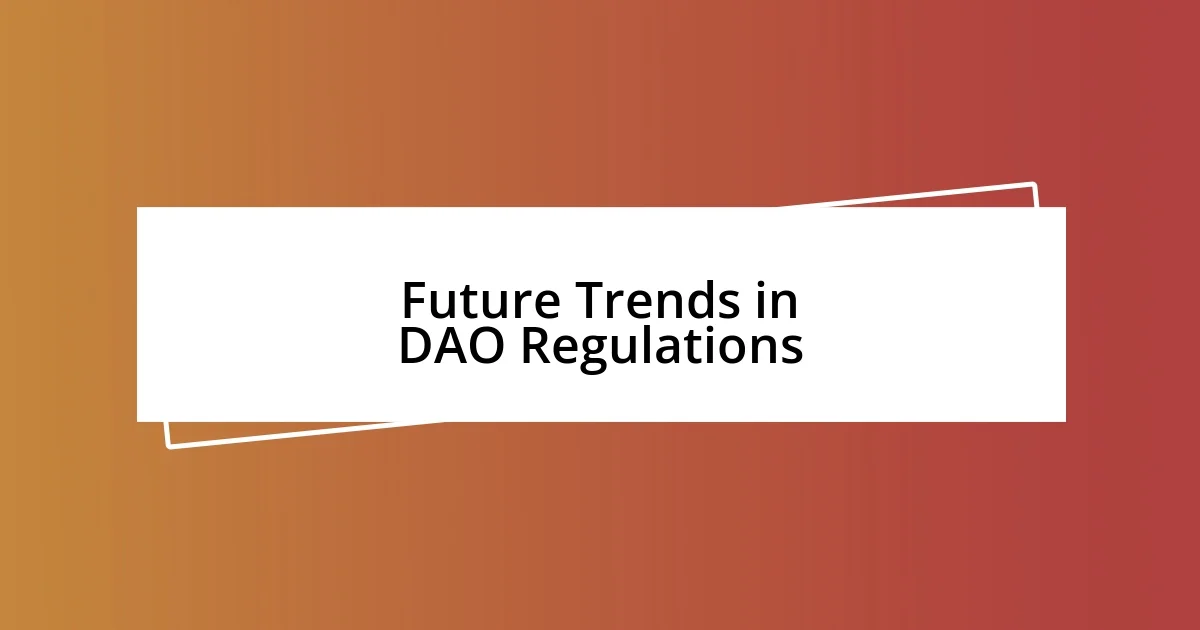
Future Trends in DAO Regulations
As I look toward the future of DAO regulations, one trend that stands out is the growing emphasis on transparency. I remember attending a workshop where industry experts discussed how increasing demands for transparency could reshape governance structures within DAOs. It’s fascinating to think that just as openness has become a cornerstone of social accountability, similar principles are likely to permeate the regulatory landscape for DAOs. How can we navigate this shift while maintaining our core mission?
Another important trend I foresee is the rise of standardized compliance frameworks. Based on my experiences, I believe having a set framework could ease the compliance burden for many DAOs, particularly those new to navigating legal regulations. I participated in a collaborative project where we proposed a basic compliance checklist tailored for DAOs, which turned out to be a collective effort that demystified many regulatory hurdles. Wouldn’t it be amazing if a universally accepted framework took root and simplified our challenges?
Lastly, I can’t help but think about the potential for regional regulations to evolve in tandem with local needs. During a recent conversation with fellow DAO members, we discussed how local cultural and legal contexts shape regulatory approaches. It struck me how important it is for DAOs to stay adaptable and engaged with their local environments. As regulations morph, won’t it be crucial for us to be proactive rather than reactive? I believe that being attuned to these shifts will ensure our organizations not only thrive but remain relevant.
